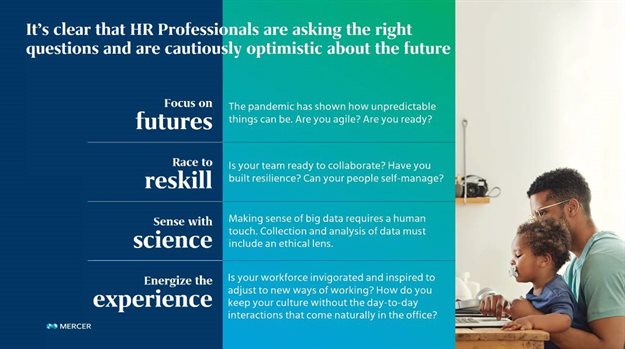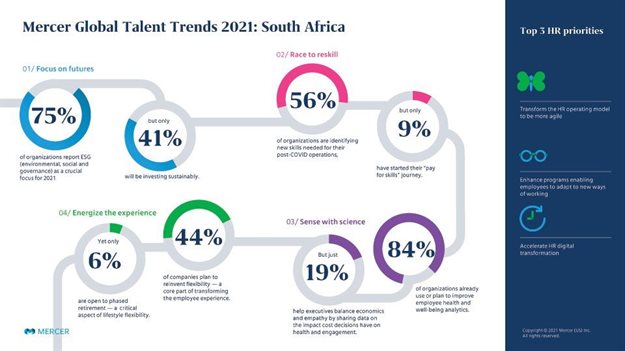Four trends have emerged as South African companies contemplate post-pandemic recovery: new thinking on talent and skills retention, embracing technology, incorporating sustainability in business models, and investing more in employee well-being, benefits and engagement. These were the findings from the South African edition of Mercer's Global Talent Trends 2020-2021 report, released last week.
While these trends emerged in 2020 as companies grappled with the pandemic, they have not only grown in relevance, but critically are going to shape the future of businesses who act now.
The four trends that South Africa companies should adopt are embracing a new multi-stakeholder model that encompasses transparency and empathy; reskilling to transform the workforce for a new world economy; harnessing the power of data and redesigning the work experience to inspire and invigorate employees.
According to the report, 75% of HR leaders in South Africa who participated in the survey expected Covid-19 to negatively affect their businesses. Defining future workforce needs and sustainably restructuring and reinventing should be top priorities for 2021, if companies and organisations are to navigate through the economic crisis sustainably and cost-effectively.
Tamara Parker, CEO for Mercer South Africa says, “Many South African companies have realised that life will never be the same again post Covid-19. Business survival will, to a large extent, depend on how companies and organisations embrace the future, use technology, invest in skilling and re-skilling employees, develop tailor-made employee benefits, incorporate mental well-being into HR models, develop sustainable working models, and embed Environmental, Social and Governance (ESG) practices in business models.”
Parker added, “Up to 67% of the companies surveyed are already building ESG goals into their broader transformation agendas, significantly more than the global average (45%); while one in five organisations (20%) are embedding ESG metrics into executive scorecards.”
As a result, companies and organisations have started deeper conversations on such issues as developing people practices that will endure post the pandemic, finding sustainable flexible employee models which can be used as foundations for growth, or for reinventing the future. Companies are now confronted with unavoidable conversations on how they can use the lessons of the pandemic and use innovation, born out of necessity, to develop a new way of working and plan for reinvention and innovation.
At the media briefing for the release of the Global Talent Trends 2020-2021 report on Wednesday, 3 March, Tesantha Naidoo, senior associate at Mercer, reiterated these four key dimensions to redefine success - transform organisational design, cultivate well-being, align new technology, and build human-centric leadership culture.
Ready, set, reskill
Naidoo pointed out that two of the major barriers HR faces when it comes to employee reskilling are a lack of budget and lack of direction. She believes it is imperative HR to work more closely with business in order to successfully assist with this process.
The trend report has revealed that the race to reskill for a new world economy has started. Of the companies surveyed, at least 63% are already targeting workforce reskilling towards critical talent pools, while 13% intend to increase spending on workforce upskilling/reskilling for the entire workforce.
Naidoo suggested that, “Companies and organisations should identify skills that will be needed in the future and share this information with employees. “Sharing information also means creating pathways for employees to fill future roles in an organisation.”
Reenergising the employee experience
Keletjo Chiloane, also a senior associate at Mercer, pointed out the biggest issue for HR in 2021 is employee fatigue. So how do we energise the employee experience?
- Stay connected to the people
- design for health and well-being
- co-create new experiences
- focus on target interactions
"Big data is going to be the centrepiece of programmes to re-engage employees." Of the companies surveyed, 38% want to enable digital health check-ups to promote health goals.
A third of those surveyed planned to address mental or emotional well-being at the workplace, a similar number said they want to introduce a mental well-being strategy, and just under 30% of those surveyed planned to train managers to spot mental health issues before they became an issue.
Overall and in order for businesses to succeed, companies need to develop HR strategies and redesign business models which reflect the new digital reality, as well as the new shape of work.
Navigating disruption
Bizcommunity.com chatted further with Parker as to how the pandemic and other policies are disrupting the workplace, and how organisations are navigating these changes.
In order to comply with Covid-19 workplace OHS regulations, every organisation is mandated to appoint a Covid-19 compliance officer. Should this be a new hire entirely? And if not, who would be the best or most logical person to appoint in this regard?

Tamara Parker, CEO for Mercer South Africa
Tamara Parker: New jobs should only be created when the competencies (skills, knowledge, experience, etc.) are fundamentally different to jobs that already exist. In the case of a Covid-19 compliance officer, the requirements are in addition to what already exists in an OHS / SHEQ organisation, but the competencies remain the same. Therefore, the Covid-19 compliance officer should form part of this existing structure. That said, not all companies have a fully-fledged OHS / SHEQ structure - these structures are more prominent in mining and manufacturing, etc. - in which case, a new hire may be necessary.
Should reskilling mean more work? As an employee acquires new skills, an organisation may be inclined to add to their workload without making the necessary adjustments in other areas. What is the proper way to handle this?
Parker: Reskilling should not necessarily result in more work; however this is dependent on how the new jobs are designed within an organisation. For example, if 50% of a job is automated, this implies that the employee(s) will then have 50% capacity to perform new/different tasks. This has a direct impact on the employee experience, employee performance as well as organisational performance. In order to attract and retain talent and build a strong employer brand, HR together with business need to ensure that employees are empowered to continuously learn and grow without negatively impacting the employee experience. Going forward, organisations should not embark on business transformation, workforce transformation, cultural transformation or HR transformation in isolation. Any form of transformation needs to be interconnected, which moves away from the traditional siloed approach.
As far as employee data privacy compliance goes, organisations may not realise that they're getting it wrong. What are some glaring examples of this, and what can they do to correct it?
Parker: The implementation of the Protection Of Personal Information (PoPi) Act has meant a renewed focus on understanding what data companies collect from employees and how they store, share and manage this data. We have seen a significant shift in awareness of employee data as PoPI is being implemented in organisations.
Prior to PoPI, some employers may have been lax in their cybersecurity practices, or may have collected more information than they required. The PoPi Act permits the employee to enquire what personal information the organisation possesses on them and how this is being utilised.
In order to ensure compliance, organisations should consider reviewing and updating their policies and practices around data collection, storage and further processing in compliance to the PoPi Act.
How have you seen the employee experience evolve in the last 4-5 years - in what forms was it initially implemented and what has it become?
Parker: Engagement has always been an important focus and many organisations run engagement surveys annually to assess levels of engagement. Additionally, the correlation between engagement and business performance has also been well known. The engagement conversation has traditionally been an HR drive with very little involvement from senior leaders and people managers. However, this is beginning to shift. The pandemic and the necessity to lockdown have elevated the conversation more broadly, with other members of executive teams now fully realising its importance.
Given that remote working is set to continue and the post-pandemic workplace will look very different, organisations are now looking to reinvent the ways that they keep employees engaged.
For more information on or a copy of Mercer’s Global Talent Trends 2020-2021 report, visit https://africa.mercer.com/our-thinking/career/global-talent-hr-trends.html






































